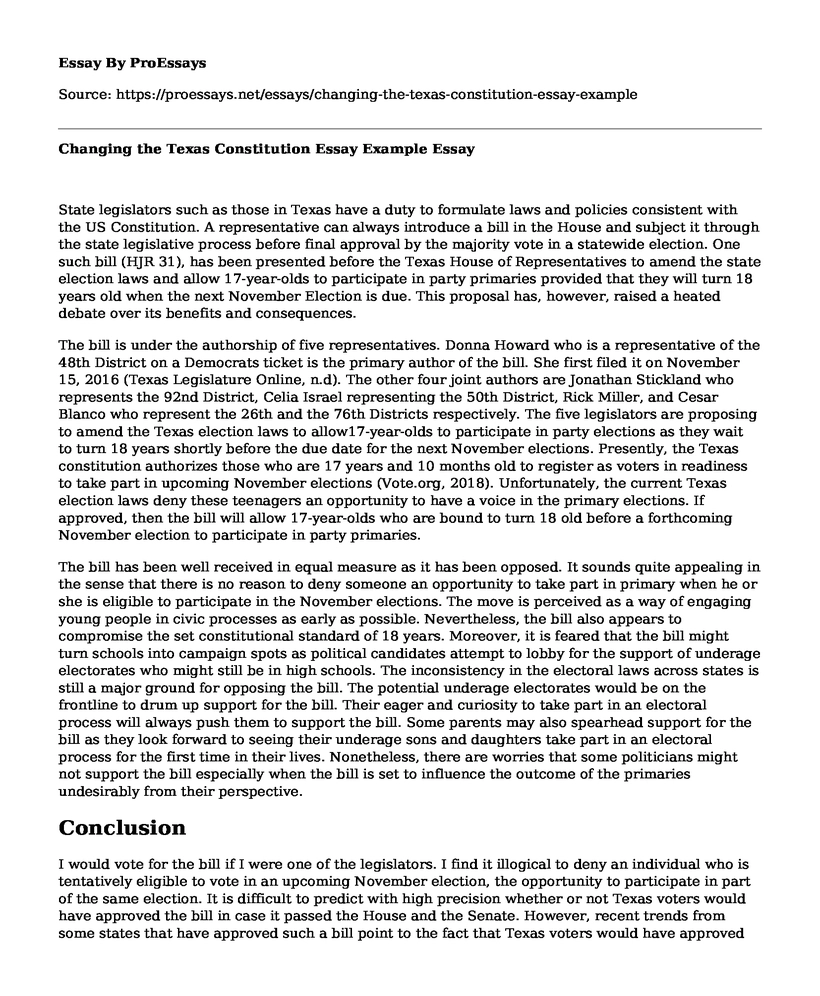State legislators such as those in Texas have a duty to formulate laws and policies consistent with the US Constitution. A representative can always introduce a bill in the House and subject it through the state legislative process before final approval by the majority vote in a statewide election. One such bill (HJR 31), has been presented before the Texas House of Representatives to amend the state election laws and allow 17-year-olds to participate in party primaries provided that they will turn 18 years old when the next November Election is due. This proposal has, however, raised a heated debate over its benefits and consequences.
The bill is under the authorship of five representatives. Donna Howard who is a representative of the 48th District on a Democrats ticket is the primary author of the bill. She first filed it on November 15, 2016 (Texas Legislature Online, n.d). The other four joint authors are Jonathan Stickland who represents the 92nd District, Celia Israel representing the 50th District, Rick Miller, and Cesar Blanco who represent the 26th and the 76th Districts respectively. The five legislators are proposing to amend the Texas election laws to allow17-year-olds to participate in party elections as they wait to turn 18 years shortly before the due date for the next November elections. Presently, the Texas constitution authorizes those who are 17 years and 10 months old to register as voters in readiness to take part in upcoming November elections (Vote.org, 2018). Unfortunately, the current Texas election laws deny these teenagers an opportunity to have a voice in the primary elections. If approved, then the bill will allow 17-year-olds who are bound to turn 18 old before a forthcoming November election to participate in party primaries.
The bill has been well received in equal measure as it has been opposed. It sounds quite appealing in the sense that there is no reason to deny someone an opportunity to take part in primary when he or she is eligible to participate in the November elections. The move is perceived as a way of engaging young people in civic processes as early as possible. Nevertheless, the bill also appears to compromise the set constitutional standard of 18 years. Moreover, it is feared that the bill might turn schools into campaign spots as political candidates attempt to lobby for the support of underage electorates who might still be in high schools. The inconsistency in the electoral laws across states is still a major ground for opposing the bill. The potential underage electorates would be on the frontline to drum up support for the bill. Their eager and curiosity to take part in an electoral process will always push them to support the bill. Some parents may also spearhead support for the bill as they look forward to seeing their underage sons and daughters take part in an electoral process for the first time in their lives. Nonetheless, there are worries that some politicians might not support the bill especially when the bill is set to influence the outcome of the primaries undesirably from their perspective.
Conclusion
I would vote for the bill if I were one of the legislators. I find it illogical to deny an individual who is tentatively eligible to vote in an upcoming November election, the opportunity to participate in part of the same election. It is difficult to predict with high precision whether or not Texas voters would have approved the bill in case it passed the House and the Senate. However, recent trends from some states that have approved such a bill point to the fact that Texas voters would have approved the bill (National Conference of State Legislatures, 2018). Generally, all the states in the country should consider adopting similar electoral policies as this proposed in Texas to create uniformity in voting eligibility.
References
National Conference of State Legislatures. (September 5, 2018). Voting Age for Primary Elections. Retrieved February 26, 2019, from, http://www.ncsl.org/research/elections-and-campaigns/primaries-voting-age.aspx
Texas Legislature Online. (n.d). Authors. Retrieved February 26, 2019, from https://capitol.texas.gov/BillLookup/Authors.aspx?LegSess=85R&Bill=HJR31
Vote.org. (October 9, 2018). Register to Vote in Texas. Retrieved February 26, 2019, from https://www.vote.org/register-to-vote/texas/
Cite this page
Changing the Texas Constitution Essay Example. (2022, Dec 06). Retrieved from https://proessays.net/essays/changing-the-texas-constitution-essay-example
If you are the original author of this essay and no longer wish to have it published on the ProEssays website, please click below to request its removal:
- Court Standards
- Essay Sample on High Tech Crimes
- The US-Mexico Border Wall Controversy - Articles Analysis Essay
- Research Paper on Violence and Brutality on the US-Mexico Borders
- Statistical Analysis Essay on Criminal Report by Accomack County Sherriff Office
- Social Security: An Effective Support Program Reducing Mortality & Disparities - Essay Sample
- Political System: Impact on Citizens Within a Country's Borders - Essay Sample







